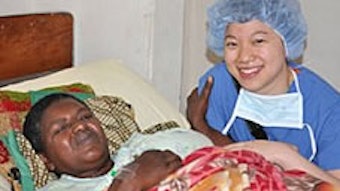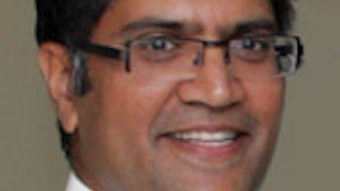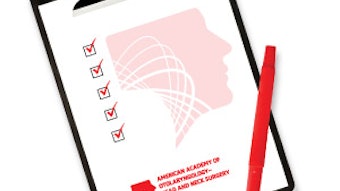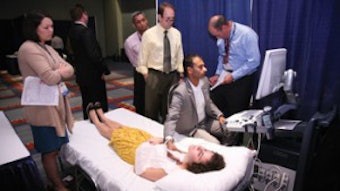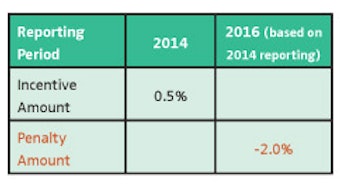Time to Retool the Mommy Track from the WIO Section
Cristina Cabrera-Muffly, MD Assistant Professor, University of Colorado Aurora, CO for Women in Otolaryngology (WIO) Section Last month, while driving my 3-year-old to daycare, he emphatically stated, “Mommy, you can’t be a doctor and a mommy.” This was a complete non sequitur to the prior discussion of trucks on the highway that morning. Completely taken aback, it took all my willpower not to pull over and address his comment. Instead, I calmly stated that I was both a mommy and a doctor and vowed to repeat this message multiple times in the coming weeks. His statement did get me thinking, however. Is this just “kids say the darndest things,” or does he have a point? As an academic otolaryngologist, can I be as successful and advance in my career as quickly and as effectively as my male colleagues, or does motherhood put me on the dreaded “mommy track” to nowhere? There has been a lot of discussion about motherhood and career advancement recently. The two loudest voices in popular culture are Facebook COO Sheryl Sandberg through her book Lean In: Women, Work, and the Will to Lead (which reached No. 1 on The New York Times bestseller list) and Anne-Marie Slaughter, whose article in The Atlantic, “Why Women Still Can’t Have It All,” was the most read story on The Atlantic’s website ever. While both argue that societal constructs such as lack of female role models to sponsor changes, the stigma of maternity leave, and impractical school schedules keep women from advancing in their fields, they differ in their opinions about how to solve the problem. Sandberg puts the onus on women themselves, advising them to be more ambitious and aggressive. Slaughter opines that ambition is not enough, and real progress will not occur until the subtle (and sometimes not-so-subtle) stereotypes about working mothers begin to change. In light of this debate, I turned to other female academic otolaryngologists for their opinions. One woman stated, “There is no such thing as ‘mommy track,’ and I think we have to be careful what women in otolaryngology or any field use as a term to describe what we want.” Another recommended renaming the mommy track to the “integrated career and family track.” No one liked the term “mommy track” and I wholeheartedly agree. If we are to propagate the species, pregnancy and childbirth are a biologic fact for women, not a “track” to be chosen in lieu of a career. By labeling working mothers in this way, we become an easy target for our colleagues to diminish our contributions. After all, women do not leave medicine only for motherhood. No one would think to label an “illness or disability track.” How do we become both the types of doctors and mothers we want to be? The greatest frustration voiced by many women was the lack of work schedule flexibility. While in medicine we cannot work from home, adjustments in school schedules and operating room schedules would make it significantly easier to care for both our patients and our children. Summer vacations and late school start times are difficult for any working parent, not just female physicians. The ability to be flexible also depends on the home support system. Most women I spoke with who had partners at home attributed much of their success to such assistance. Another theme was that opinions about female career advancement seem to be a “generational difference, not a gender difference.” One woman stated that both she and her male colleague have young children, and they both work hard during the week but do not volunteer for “extras” such as having dinner with a new faculty candidate or spending Saturday at a low-yield meeting. Most women felt that faculty members early in their careers, whether male or female, prioritize family life more than a generation ago. Another woman commented, “The old guard that worked and neglected their families might not only have it wrong, but their disconnect from society might keep them from being as good a doctor as one with a balanced life. There is value in life outside of medicine, and we are richer for it.” “Solutions for systems and institutions must meet and improve lives for all, not just one group, and not just for women” stated one. I could not have put it better myself. It is critical to have a supportive chair and mentor who can facilitate these solutions. Subtle departmental cues, like believing that it is okay to go home early to play a round of golf but not to take your child to the doctor, negatively impact every member of the department. Why should chairs and mentors strive to help women find solutions for balancing work and home? The answer is to improve both immediate and future productivity. Women who feel supported will work harder and be more committed to their careers and their departments. In “Gender disparities in scholarly productivity within academic otolaryngology departments” Eloy, et al.1 show that women produce less research output early in their careers, but meet or exceed this output later in their careers. If women leave before they become a professor, they will never achieve that later career contribution. Secondly, there is a significant potential impact of having a female mentor available to you as a female resident or medical student. The only way to increase the number of female professors and chairs is to encourage them to step into the pipeline when they are residents. Is it any surprise that in my role as associate program director to a male program director, female residents turned to me first when divulging they were pregnant? In my case, the male program director was just as supportive as I was, but as a woman who had just had a child, they felt more comfortable approaching me about how to announce their pregnancy to the department. When they confided in me, I always told them the road would be difficult, but it was still possible to achieve their goals in their career. The keys are to work as hard as possible, find good help at home, and don’t let anyone have low expectations of you. In short, they, too, can be both a doctor and a mommy. Hopefully, some day, my son will understand this, too. Reference Eloy JA, et al. Gender disparities in scholarly productivity within academic otolaryngology departments. Otolaryngol Head Neck Surg. 2013 Feb;148(2):215-222. Dates to Remember Go to http://www.entnet.org/conferencesandevents to see a full listing; to list events, email memberservices@entnet.org. September 29-October 2 AAO-HNSF 2013 Annual Meeting & OTO EXPOSMCoding and Reimbursement Workshops September 13-14 – Minneapolis, MN October 25-26 – Las Vegas, NV November 8-9 – Chicago, IL November 4 Instruction Course and Miniseminar – Call for Papers is open.
Cristina Cabrera-Muffly, MD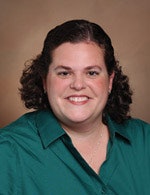
Assistant Professor, University of Colorado
Aurora, CO for Women in Otolaryngology (WIO) Section
Last month, while driving my 3-year-old to daycare, he emphatically stated, “Mommy, you can’t be a doctor and a mommy.” This was a complete non sequitur to the prior discussion of trucks on the highway that morning.
Completely taken aback, it took all my willpower not to pull over and address his comment. Instead, I calmly stated that I was both a mommy and a doctor and vowed to repeat this message multiple times in the coming weeks. His statement did get me thinking, however. Is this just “kids say the darndest things,” or does he have a point? As an academic otolaryngologist, can I be as successful and advance in my career as quickly and as effectively as my male colleagues, or does motherhood put me on the dreaded “mommy track” to nowhere?
There has been a lot of discussion about motherhood and career advancement recently. The two loudest voices in popular culture are Facebook COO Sheryl Sandberg through her book Lean In: Women, Work, and the Will to Lead (which reached No. 1 on The New York Times bestseller list) and Anne-Marie Slaughter, whose article in The Atlantic, “Why Women Still Can’t Have It All,” was the most read story on The Atlantic’s website ever. While both argue that societal constructs such as lack of female role models to sponsor changes, the stigma of maternity leave, and impractical school schedules keep women from advancing in their fields, they differ in their opinions about how to solve the problem. Sandberg puts the onus on women themselves, advising them to be more ambitious and aggressive. Slaughter opines that ambition is not enough, and real progress will not occur until the subtle (and sometimes not-so-subtle) stereotypes about working mothers begin to change.
In light of this debate, I turned to other female academic otolaryngologists for their opinions. One woman stated, “There is no such thing as ‘mommy track,’ and I think we have to be careful what women in otolaryngology or any field use as a term to describe what we want.” Another recommended renaming the mommy track to the “integrated career and family track.” No one liked the term “mommy track” and I wholeheartedly agree. If we are to propagate the species, pregnancy and childbirth are a biologic fact for women, not a “track” to be chosen in lieu of a career. By labeling working mothers in this way, we become an easy target for our colleagues to diminish our contributions. After all, women do not leave medicine only for motherhood. No one would think to label an “illness or disability track.”
How do we become both the types of doctors and mothers we want to be? The greatest frustration voiced by many women was the lack of work schedule flexibility. While in medicine we cannot work from home, adjustments in school schedules and operating room schedules would make it significantly easier to care for both our patients and our children. Summer vacations and late school start times are difficult for any working parent, not just female physicians. The ability to be flexible also depends on the home support system. Most women I spoke with who had partners at home attributed much of their success to such assistance.
Another theme was that opinions about female career advancement seem to be a “generational difference, not a gender difference.” One woman stated that both she and her male colleague have young children, and they both work hard during the week but do not volunteer for “extras” such as having dinner with a new faculty candidate or spending Saturday at a low-yield meeting. Most women felt that faculty members early in their careers, whether male or female, prioritize family life more than a generation ago. Another woman commented, “The old guard that worked and neglected their families might not only have it wrong, but their disconnect from society might keep them from being as good a doctor as one with a balanced life. There is value in life outside of medicine, and we are richer for it.”
“Solutions for systems and institutions must meet and improve lives for all, not just one group, and not just for women” stated one. I could not have put it better myself. It is critical to have a supportive chair and mentor who can facilitate these solutions. Subtle departmental cues, like believing that it is okay to go home early to play a round of golf but not to take your child to the doctor, negatively impact every member of the department. Why should chairs and mentors strive to help women find solutions for balancing work and home? The answer is to improve both immediate and future productivity. Women who feel supported will work harder and be more committed to their careers and their departments.
In “Gender disparities in scholarly productivity within academic otolaryngology departments” Eloy, et al.1 show that women produce less research output early in their careers, but meet or exceed this output later in their careers. If women leave before they become a professor, they will never achieve that later career contribution. Secondly, there is a significant potential impact of having a female mentor available to you as a female resident or medical student.
The only way to increase the number of female professors and chairs is to encourage them to step into the pipeline when they are residents. Is it any surprise that in my role as associate program director to a male program director, female residents turned to me first when divulging they were pregnant? In my case, the male program director was just as supportive as I was, but as a woman who had just had a child, they felt more comfortable approaching me about how to announce their pregnancy to the department. When they confided in me, I always told them the road would be difficult, but it was still possible to achieve their goals in their career. The keys are to work as hard as possible, find good help at home, and don’t let anyone have low expectations of you. In short, they, too, can be both a doctor and a mommy. Hopefully, some day, my son will understand this, too.
Reference
- Eloy JA, et al. Gender disparities in scholarly productivity within academic otolaryngology departments. Otolaryngol Head Neck Surg. 2013 Feb;148(2):215-222.
Go to http://www.entnet.org/conferencesandevents to see a full listing; to list events, email memberservices@entnet.org.
AAO-HNSF 2013 Annual Meeting & OTO EXPOSMCoding and Reimbursement Workshops
- September 13-14 – Minneapolis, MN
- October 25-26 – Las Vegas, NV
- November 8-9 – Chicago, IL
November 4
Instruction Course and Miniseminar – Call for Papers is open.









